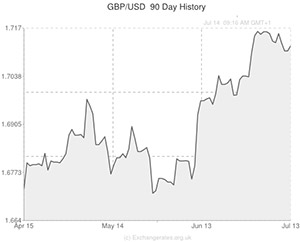
During a speech in Frankfurt last night European Central Bank President Mario Draghi said that a strong Euro exchange rate could compromise stability in the region and hinted that a quantitative easing scheme could be introduced in the near future.
The ECB President reaffirmed that the exchange rate is not one of the bank’s policy targets but did go as so far as to mention that a stronger Euro could have a negative impact on price inflation.
‘Certainly, the appreciation that has taken place since mid-2012 has had an impact on price stability. In the present context, an appreciated exchange rate is a risk to the sustainability of the recovery.’
The Eurozone consumer price index is currently running at a 4.5-year low of 0.5%, a figure which is likely to be confirmed later in the week. Although there has been little evidence to suggest that consumers are delaying purchases to obtain cheaper prices in the future – the standard definition of deflation – the threat of persistently low inflation is currently the ECB’s biggest concern.
Yesterday afternoon the International Monetary Fund released a report warning that the tepid recovery in the Eurozone is not sustainable and that the currency bloc could slide towards depression if more stimulus is not provided.
The IMF report detailed how a quantitative easing scheme could help drive inflation higher and mentioned that bond-buying could raise growth expectations by increasing demand for credit.
During his speech Draghi hinted that the ECB is prepared to start purchasing bonds:
‘The Governing Council is unanimous in using unconventional measures to address the risk of a prolonged period of too low inflation. QE falls squarely in our mandate.’
However, the Pound to Euro exchange rate (GBP/EUR) remained at 1.2540 – half a cent down on the day – following Draghi’s dovish comments.
It seems that investors are feeling slightly less optimistic that the Bank of England will start raising interest rates in 2014 in light of last week’s softer-than-anticipated UK manufacturing and construction reports.
The Pound to Euro exchange rate could suffer further losses later on today if the UK CPI report remains at a 5-year low of 1.5%. On the other hand, Sterling has the potential to rally if inflation prints at 1.6% or above.
BoE Governor Mark Carney could also have an impact on demand for Sterling this morning. He is due to give a speech at 10:00 in which it is expected that he will discuss the British housing market. Any signs that he is ready to start raising interest rates could boost the Pound, whilst any hints to the contrary could send Sterling lower versus the Euro.
UPDATED 15:20 GMT 15 July, 2014
Pound to Euro Exchange Rate Rallies on CPI Gain
Over the course of European trading a stronger-than-anticipated increase in UK consumer prices saw the Pound post widespread gains.
The British asset rallied against almost all of its most traded currency counterparts as the impressive 1.9% annual increase in the Consumer Price index took inflation closer to the Bank of England’s 2% target.
With speculation surrounding the prospect of a November rate hike feverish once more, the Pound to Euro (GBP/EUR) exchange rate jumped by 0.66%, pushing back above technical resistance of 1.26.
Sterling’s impressive performance against the Euro was aided by the fact that the ZEW measures of Economic Sentiment for Germany and the Eurozone declined by more than anticipated.
UPDATED 09:00 GMT 16 July, 2014
Pound Riding High before Jobs Stats
After posting widespread gains on Tuesday in response to the UK’s unexpectedly encouraging inflation report, the Pound was still trading in a stronger position against the majority of its counterparts on Wednesday.
The Pound to Euro (GBP/EUR) exchange rate is trending above the 1.26 level.
However, if today’s employment reports show another period of near-stagnant wage growth Sterling could reverse its recent gains.
It is expected that average weekly earnings increased by just 0.5% in the three months to May, down from wage growth of 0.7% in the three months to April.
The UK’s unemployment rate is expected to have eased to a fresh multi-year low.
The Eurozone’s Trade Balance figures could also have an impact on the Pound to Euro exchange rate.

Comments are closed.